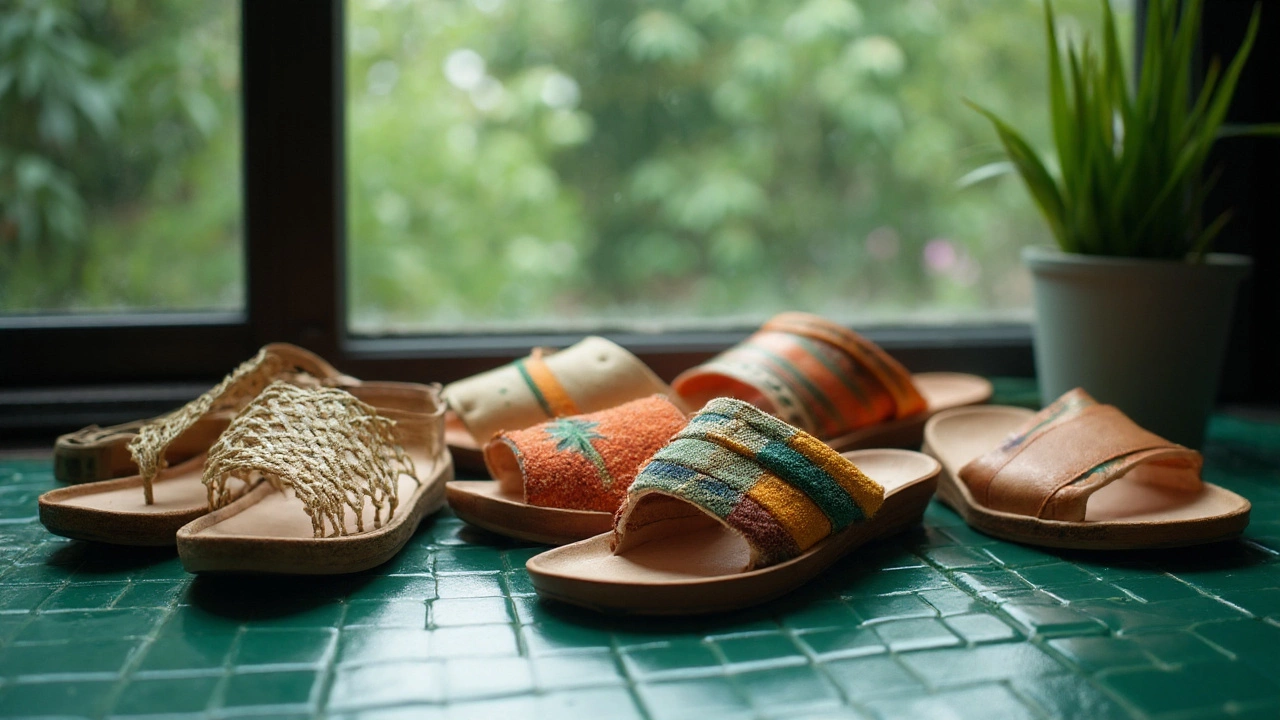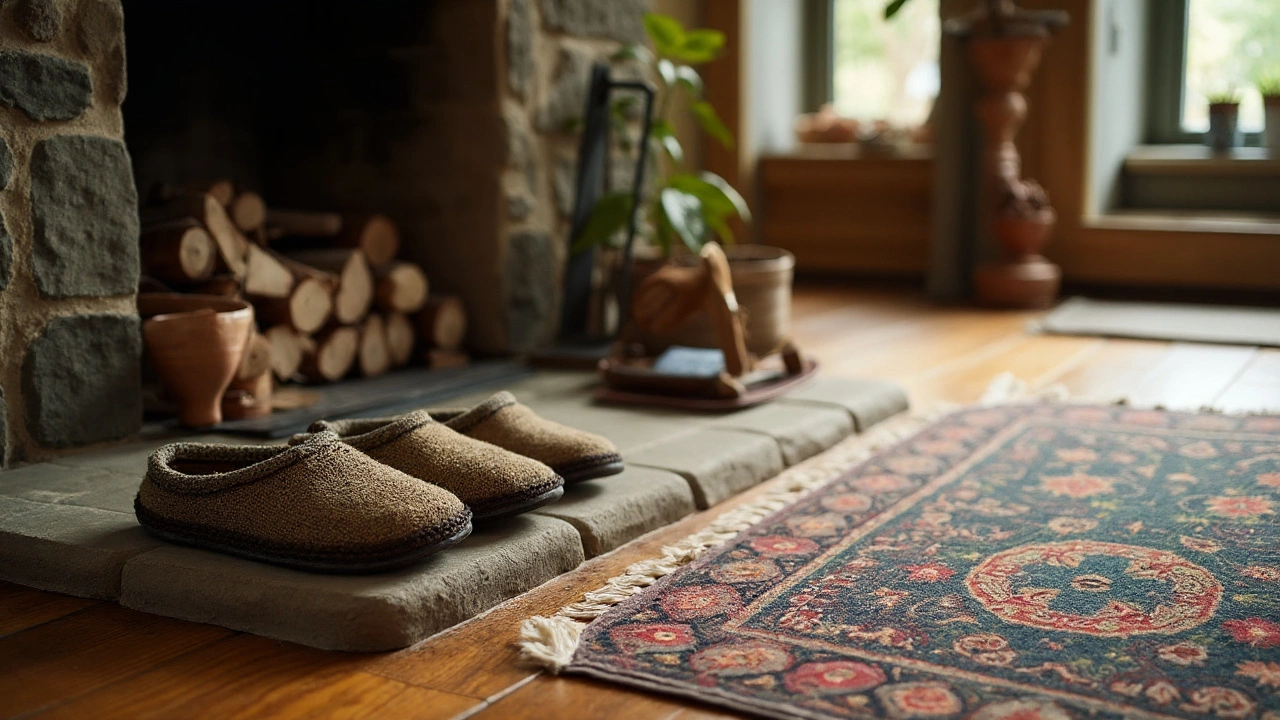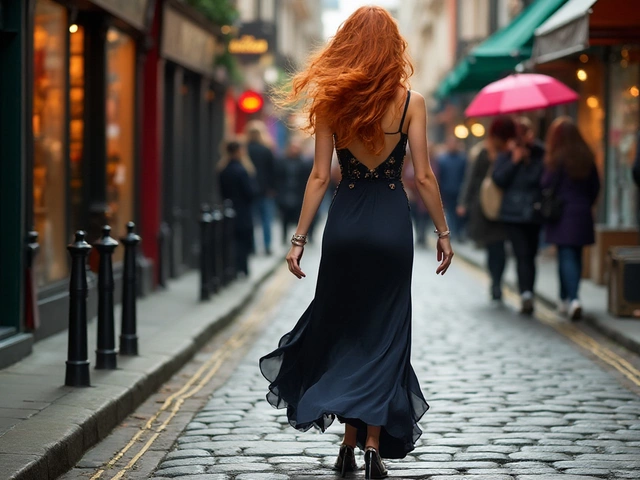Most Irish homes have a story about slippers—those stashed by the Aga in a Kerry kitchen, or the battered pair sitting by the front door in a Dublin flat. But have you ever thought about the Japanese version? In Ireland, where cold floors are pretty much standard, finding that perfect pair for comfort isn’t just about cosiness. It’s also cultural. Some Irish folks are now switching from fluffy Penneys slippers to something with a bit more history: Japanese slippers. But what are they actually called, and why are folks across Ireland swapping their Dunnes Stores specials for Japanese designs?
Japanese Slippers: Unpacking the Names and Types
Japan isn’t a one-slipper-fits-all sort of place. Instead, there are different names—and styles—you’ll want to know if you're browsing a shop or searching online from your home in Cork or Galway. The most popular types? Zori, geta, and uwabaki. Each has its own story. Zori are the flat, thonged sandals that kind of resemble a beefed-up flip-flop—think of the ones you might use at the swimming pool, but much nicer. Geta are the wooden sandals with raised platforms, often paired with traditional kimono at Japanese festivals. Uwabaki are indoor fabric shoes, worn in schools and homes, designed to leave the dirt at the door and keep tatami mats spotless.
What makes them stand out is the design purpose. Unlike the thick fleece pairs you’d find in the 'slipper aisle' of Dunnes or Tesco, Japanese slippers focus on keeping spaces clean, not just feet warm. Uwabaki, for instance, are mandatory for kids in Japanese schools—imagine if schools across Ireland handed out indoor shoes at the door!
How Japanese Slippers Fit Into Irish Life
Irish homes are notoriously draughty, and the idea of taking off your shoes inside isn’t strong here—unless you grew up in a house with white carpets. Japanese slippers, though, fit naturally into the growing eco-movement in Ireland. With more people switching to wood or laminate floors in places like Westport or Dún Laoghaire, keeping the muck outside makes sense. Japanese slippers become an easy way to keep the place clean, especially in winter when gravel and grit follow you in.
Plenty of Irish Airbnb hosts and boutique hotels are already leaning into the trend. Ask in trendy guesthouses in Waterford or Sligo, and you might find uwabaki waiting for you by the door, adding a thoughtful, international touch. They’re soft, lightweight, easy to wash, and they hold up far better than flimsy hotel slippers. Plus, they’re just plain fun to wear—there’s a novelty in sliding into uwabaki that’s hard to beat. Unlike the usual novelty slippers shaped like sheep or pints of Guinness, Japanese ones have a clean, understated look that’s oddly satisfying after a long day.

Which Kind Should You Choose?
If you’re shopping for Japanese slippers in Ireland, start by working out your needs. Are you looking for something to wear inside all day? Uwabaki will be your best bet. They’re made from soft, breathable materials, so your feet won’t turn into icicles. Find them in some Asian supermarkets in Dublin or order them through Irish e-commerce shops like Littlewoods Ireland and even Etsy Ireland—don’t forget to size up, Japanese slippers can run small. If you’re after something a bit quirky or looking to pair them with a kimono for a themed party (hello, Body & Soul Festival), geta are perfect. But watch out—those wooden soles take some getting used to, especially on uneven ground. Zori are great if you want something for summer garden parties or trips to the pool. They’re casual but still have traditional flair.
For anyone with cold floors in a renovated farm cottage or a city apartment, pairing thick socks with uwabaki can be a simple, affordable fix. And because Japanese design prizes practicality, you’ll find they last longer than most Irish high street slippers. If you’re running an eco-conscious rental, a hamper of uwabaki at check-in is bound to impress European guests used to the no-shoe rule.
Surprising Facts and History: Where Did Japanese Slippers Come From?
Japanese slippers have a story that stretches back centuries. Zori were traditionally made from rice straw or lacquered wood—no animal products, which makes them ideal for vegans in Ireland. Geta date back to ancient farmers needing to keep their feet out of the mud in rainy rice fields, a vibe that actually fits autumn strolls through Irish countryside rather well. Uwabaki, on the other hand, cropped up as Japan modernised, with the country’s interior spaces becoming more formal and the line between inside and outside stricter. Think about it: you wouldn't dream of tromping through a Japanese house wearing Wellies, and once you slip into uwabaki, you’ll get why.
Japanese slippers gained new global popularity after the Tokyo Olympics, with searches from Irish IP addresses skyrocketing by 38% since 2023. Several independent Japanese footwear brands now ship to Ireland, including SUICOKE and Asakusa Geta, making it far easier to try traditional styles without the plane ticket.
| Type | Irish Equivalent | Material | Main Use |
|---|---|---|---|
| Zori | Summer Flip-Flop | Straw, Synthetic | Casual, Outdoor/Indoor |
| Geta | Clog/Sabot | Wood, Fabric | Traditional, Outdoor |
| Uwabaki | Soft Indoor Slipper | Cotton, Canvas, Rubber | Indoor Only |
Irish-Japanese cultural events like the Experience Japan festival in Dublin often run workshops on traditional dress, including how to walk in geta and zori without embarrassing yourself (it’s harder than it looks). And if you ever spot bonsai enthusiasts gathered at Phoenix Park, check their feet—they might be sporting uwabaki for the authenticity.

Where to Buy: Shop Smart in Ireland
You don’t need a Ryanair flight to Tokyo to get your hands on Japanese slippers. In Ireland, you’ll find uwabaki and zori in Asian supermarkets—like Asia Market in Dublin or Orient Asian Market in Galway. For style options that lean modern, major Irish online retailers, as well as Irish-run eBay shops, offer a small but growing selection. Want something a bit fancier? SUICOKE, the Japanese designer brand known for ergonomic slippers, ships to Ireland—a nice treat for your feet during those long, rainy winters.
If you’re not sure about your size, check reviews left by co-shoppers in Ireland. A safe bet is to choose one size up from your usual, as many Japanese brands expect you to wear them snug. Looking for gifts? Uwabaki sets are a huge hit at Christmas markets in Kilkenny and are easy to tuck into a Secret Santa at the office. For parents with eco-conscious teens, Japanese slippers are an ethical, low-impact present that stands out from the standard socks-and-underpants combo.
Want to keep them clean? Toss uwabaki in the wash on low heat, but skip the tumble dryer—they last longer if you air dry them. Zori and geta just need a quick wipe-down. For anyone nervous about fit, consider adjustable uwabaki with elastic backs—handy if several people will use the same pair, like at large family gatherings or holiday lets on the Wild Atlantic Way.
More Irish homes are setting up 'slipper stations' by the door, with a mix of uwabaki for guests. It’s a trend worth copying—less dirt, less mopping, more comfort for everyone who crosses the threshold.





